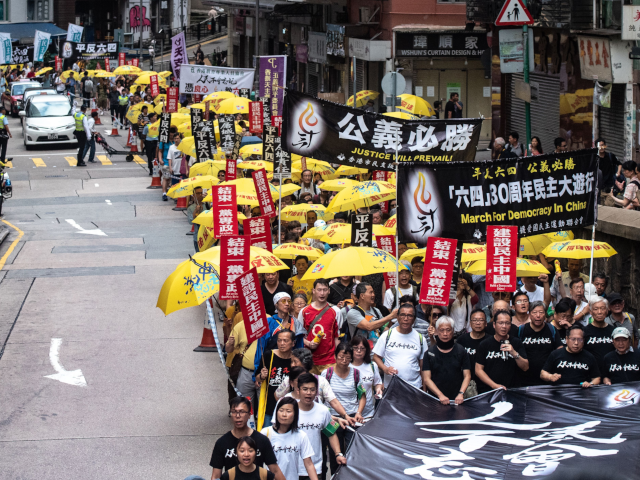Thousands of protesters demonstrated in Hong Kong on Sunday to demand accountability for the untold number of people murdered by the Chinese Communist government in Tiananmen Square thirty years ago.
June 3 will mark the 30th anniversary of the day Chinese troops launched a deadly crackdown on pro-democracy demonstrators. Beijing ruthlessly suppresses all discussion of the Tiananmen massacre and has never released an official number of people who were killed and wounded.
Reuters noted the semi-autonomous cities of Hong Kong and Macau are the only places in China where the massacre can be commemorated with public demonstrations. Hong Kong protesters made an extra effort for the 30th anniversary, linking Tiananmen to Hong Kong’s own struggle for independence with symbolic yellow umbrellas:
The Hong Kong demonstrators marched to China’s main representative “liaison” office in the city, where some held up banners while chanting slogans including “the people will not forget”.
Many of the protesters also held up yellow umbrellas, a symbol of Hong Kong’s 2014 pro-democracy “umbrella revolution”, while calling for the scrapping of a proposed extradition law that would allow people to be sent to China to face trial.
Lawyers, business people and diplomats have expressed widespread concern that the law could extend China’s control into Hong Kong and undermine the city’s vaunted rule of law.
The umbrellas carried the words “Support freedom. Oppose evil law”.
“The Hong Kong people have not forgotten the event of 30 years ago,” said lawmaker Wu Chi-wai, who heads the city’s main opposition Democratic Party.
“The (Chinese) Communist Party tries to erase those memories. But the Hong Kong people have kept it up and are looking for the day when the dictatorship on the mainland will end.”
The Sunday event drew over 2,000 participants, while a candlelight vigil scheduled for June 4 in Hong Kong’s Victoria Park is expected to bring out tens of thousands of people.
The South China Morning Post explained over the weekend that Tiananmen Square is tremendously significant to the people of Hong Kong, in part because the crackdown was taken as a grim omen for the future of relations between the former British colony and Beijing. Students demonstrating for democracy in China received a great deal of both rhetorical and financial support from Hong Kongers, who in 1989 hoped their city would become a liberalizing influence when ownership reverted to the mainland Chinese government. Instead, it became painfully clear after the massacre that Chinese Communists were prepared to kill people on a massive scale to protect their power.
“The Tiananmen Square crackdown caused Hong Kong people to lose faith in the Chinese government and in Hong Kong’s future,” University of Hong Kong history professor John Carroll mournfully observed.
The reverse dynamic was also in play, as Beijing evidently grew more reluctant to respect Hong Kong’s autonomy after the Tiananmen protests rattled Communist Party leaders. The collapse of the Soviet Union would soon rattle them even more.
Writing at the Diplomat in early May, Umbrella Movement organizer Benny Tai saw the spirit of Tiananmen surviving in Hong Kong and hoped it might find purchase in China again someday:
The Umbrella Movement of 2014, as this campaign of planned and unplanned protests came to be called, did not meet the tragic fate that the Tiananmen Square protests had suffered in 1989. The Umbrella Movement failed to change the electoral system of Hong Kong, but it reshaped the political culture. People are now much more receptive to civil disobedience as a tool of democratization, and seeds of democracy have been planted in Hong Kong’s soil.
Here, however, a word of caution is in order. Whereas older Hong Kong democrats tend to see hopes for democracy in Hong Kong as tied to hopes for democracy in China, many younger Hong Kong people reject the linkage. They favor self-determination or even full independence for Hong Kong, and may care little whether China ever becomes democratic. Yet feelings cannot override political reality. If democracy gains no ground in China, the chance that Hong Kong can become democratic will be slim.
The souls of Tiananmen Square might not be remembered by many in mainland China, but they have not left Hong Kong. By virtue of its persistence, Hong Kong’s struggle for democracy may have preserved the seeds of change in China. If so, this would not be the first time that Hong Kong has played such a role in Chinese history.
Tai was sentenced to 16 months in prison for his role in the Umbrella Movement, but unlike those who marched for freedom in Tiananmen Square three decades ago, he is not dead and has not been silenced. The carnage of June 1989 proved freedom is not as incandescent as dreamers hoped, but Hong Kong proves it is much harder to extinguish than China’s grim rulers expected.

COMMENTS
Please let us know if you're having issues with commenting.